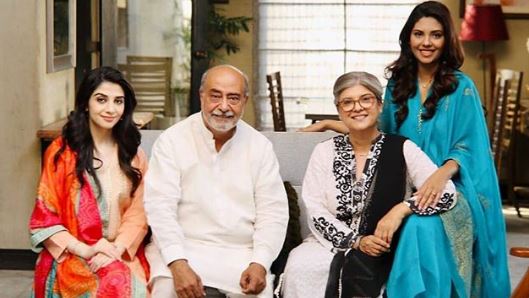Pakistani audiences certainly love their share of dramatics on-screen these days, but on the flip side, we also find ourselves drawn to emotionally heavy shows – the latter is where “Aulaad” fits in. This is a story about parents and the relationship they share with their children. Parents spend a large chunk of their lives caring for their children, but what happens when those same children refuse to care for them when they need it the most? Written by Syed Ameer Ali Shah and directed by Aabis Raza, “Aulaad” stars Mohammad Ahmed, Marina Khan, Hassan Niazi, Sunita Marshal, Nabeel Zuberi, Furqan Qureshi and Humaira Bano in prominent roles.
Episode 3 shows Khurram (Hassan Niazi) and Afreen (Sunita Marshal) leaving the house with their children. There’s an infuriating moment when Mohammad Ahmed’s character, the patriarch (I have yet to catch this character’s name), confesses to Zakiya (Marina Khan) and his daughter that he has been given his retirement letter. Khurram immediately becomes inflated in his ego once again and confronted by Adnan (Furqan Qureshi), Khurram declares that their father only apologized to him because he needed Khurram’s finances to keep the house running, reducing their relationship to a financial transaction. Unfortunately, their father overhears this and, in a tearful moment that would be painful for any father, he declares that he and his family will no longer have anything to do with Khurram. This is essentially the jist of the episode with little else taking place. As Khurram and Afreen leave the house, Mohammad Ahmed’s character falls ill, but still refuses to see Khurram, telling him he’s no longer welcome in his life, even after his death. Fortunately, the illness is just a case of gastric problems.
There’s a saying that “there can only be one head of the house” and it seems to be a battle that trickles down over generations. It’s no surprise then that in a society where joint family systems are preferred and praised, problems do arise. Khurram is a grown man, no longer a child, and feels that he cannot give his own nuclear family the attention and life they deserve because of the financial burden he carries for the joint family system. Mind you, Khurram is a nasty man with barely a kind bone in his body. When he realizes his father has retired, he smirks, fixated on the “fake” apology rather than the fact that his father needs him. However, and this is important – the father role is also one that is stereotypical of our society, a man who is rigid, and one cannot help but think “like father, like son.” Mohammad Ahmed’s character may not be money-minded, but he’s stubborn. He refuses to bid farewell to his own grandchildren and daughter-in-law, who has been the ideal daughter, caring for her in-laws more than their son. He is cruel to the rest of his family, forbidding them from speaking to Khurram, threatening that he will disown them as well if they do speak to him. These behaviors are stubborn and while he’s not wrong in being hurt by Khurram’s (cruel) actions, his reaction to the entire scenario is also over-the-top.
Aulaad Episode 2: Mohammad Ahmed Excels As The Patriarch of the Family
Mohammad Ahmed is the star of this show from the word go. Both he and Marina Khan are strong performers and as a duo, they manage to bring the viewer to tears as the audience sees this frail, elderly couple being mistreated by their eldest son. At this point in the show, Adnan will now have to shoulder the responsibility, but it’s clear that he can’t afford to do so. And how long will it take for his trouble-making wife to put her foot down and also abandon the family? Is the message here truly to stop placing all hopes on male children? One thing is clear – this show requires a box of tissues for each episode and viewers should get ready for an emotional ride.
